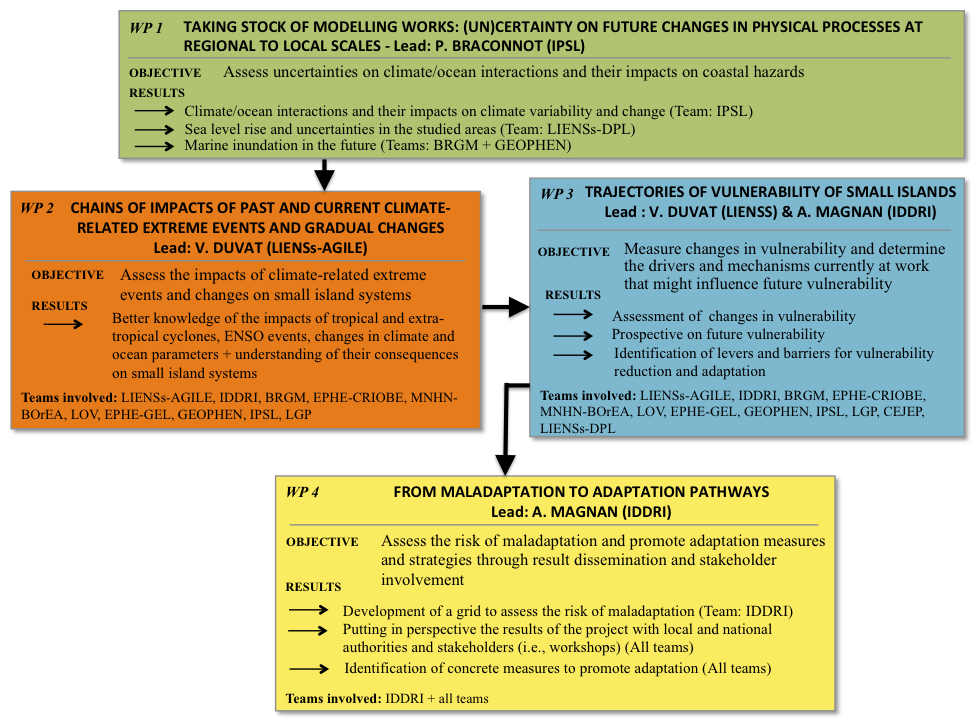Project
STORISK — Small islands addressing climate change : towards storylines of risk and adaptation
(ANR-15-CE03-0003)
This 48-month project aims at developing an integrated approach to the risks induced by climate- and sea- related hazards (i.e., coastal erosion, marine inundation and coral mortality) on coastal areas in small islands. Three French overseas territories are investigated : French Polynesia (Rangiroa, Tikehau, Mataiva and Takapoto atolls ; and Tubuai and Rurutu Islands) in the Central Pacific Ocean, and Reunion Island (4 municipalities) and the Éparses Islands (Europa, Glorieuses, Juan de Nova) in the South-Western Indian Ocean. Secondary case studies in the Indian (the Seychelles) and Pacific (Kiribati and the Cook Islands) oceans help put the results into a regional to international perspective.
A central approach is the reconstruction and analysis of chains of impacts for both specific climate events (e.g., cyclones, ENSO) and gradual environmental changes (e.g., sea level rise, ocean warming and acidification), as well as of trajectories of vulnerability. Applied to most of the case studies and associated with an in-depth analysis of the most recent knowledge from both physical and human sciences, such chains of impacts and trajectories of vulnerability help traduce the threats from current hazards and climate change into comprehensive “storylines of risk”. This allows advancing scientific knowledge a step forward (i.e., highlighting the trade-offs between current and future challenges), as well as engaging an empirically-based dialogue with local to regional and national stakeholders on how to address future threats (i.e., adaptation strategies).
STORISK gathers researchers from various disciplines (climatology, geomorphology, geophysics, ecology, human and environmental geography, political sciences, law) in a single coherent approach to better capture and analyse vulnerability and adaptation pathways in a comprehensive way. Such a transdisciplinary knowledge is crucially needed on the ground to both identify all the components of the system (e.g., coral reefs, sedimentary cells, people’s risk perception, land tenure systems, socioeconomic drivers, etc.) and their interactions, and thus to explain why vulnerability varies (i) from one place to another and (ii) from one event to another in a given area, and (iii) also changes over time. Small Islands will definitely be concerned with various storylines of risk that need to be emphasized. From a stakeholder perspective, such outcomes help inform adaptation-friendly decision-making processes in the context of climate change, with two regional workshops and a national conference planed for the end of the project.
Henceforth, STORISK aims at generating innovative transdisciplinary and practice-oriented knowledge, bringing a high added value compared to separate disciplinary investigations, especially in under-studied French overseas territories. Urge benefits for the civil society beyond Small islands are expected, as STORISK overarching objective is to clarify knowledge on the impacts of extreme events and gradual changes in the aim of feeding local to national stakeholders with both a sound understanding of what is at stake with climate change, and key guidelines to enhance robust adaptation from now on. Other expected benefits for coastal areas at large are a balanced understanding of the climate-related uncertainty issue, a didactic explanation of the processes going from hazards to impacts and vulnerability, and the highlighting of the most promising ways to enhance adaptation to climate change.
This project has been extended to October 2020.





